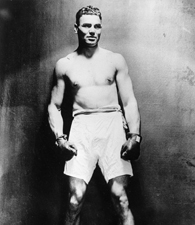Jack Dempsey was one of the great figures of the “golden age of sports” in the 1920s, a ruthless fighter known for brutal early-round knockouts. He became heavyweight champion in 1919, but it was not until he lost his title in 1926 that he became a hero.
Jack Dempsey’s Early Days
William Harrison Dempsey was born in Manassa, Colorado, on June 24, 1895. From 1911 to 1916, under the nickname “Kid Blackie,” he fought in amateur boxing matches in Western mining towns.
“Between saloon bouts he worked in the mines, shined shoes, picked fruit and hustled, riding the rods on trains and sleeping in hobo jungles,” described The New York Times’ Red Smith.
He later took the name “Jack” from his older brother, who had taken it from another boxer. Jack Dempsey quickly moved up the boxing ranks as he battered his opponents, ending many fights with first-round knockouts.
Sources in this Story
- The New York Times: Jack Dempsey, 87, is Dead; Boxing Champion of 1920’s
- International Boxing Hall of Fame: Jack Dempsey
- Boxing.com: The Horror: Jess Willard’s Toledo Injuries
- FanSided/The Cruelest Sport: Hard Times: The Mystery of the Jack Dempsey-Jess Willard Fight
- ESPN: Defeats didn’t dampen Dempsey
- Sports Illustrated: Was Jack Dempsey Robbed By The ‘long Count’?
Dempsey’s Boxing Career
Dempsey was given his first title shot on July 4, 1919, against heavyweight champion Jess Willard. Dempsey knocked Willard down seven times in the opening round and won the fight after Willard, who had broken jaw, refused to come out for the fourth round. “There was nothing artistic about Dempsey’s attack,” writes the International Boxing Hall of Fame. “It was pure rage.” Boxing.com details Willard’s injuries and has a video of the fight.
Willard would claim that Dempsey illegally “loaded” gloves, a common practice for fighters of the era. Decades later Dempsey’s manager Jack “Doc” Kearns revealed in his memoir that he had loaded Dempsey’s gloves, but Dempsey hadn’t known about it. Dempsey vehemently denied the allegation and sued Sports Illustrated for printing a story about it. Dempsey received an out-of-court settlement and a printed apology in the magazine.
Dempsey, now nicknamed the “Manassa Mauler,” was the champion, but he was not popular. He hadn’t served during World War I, and though he was acquitted of draft evasion, he received criticism for being a “slacker,” writes ESPN’s Larry Schwartz.
In a 1921 fight, Dempsey was cast as the villain against French war hero Georges Carpentier. Before the first million-dollar gate in boxing history, Dempsey knocked out Carpentier in the fourth round.
Dempsey took two years off from fighting in 1924 and ‘25, following a fight against Argentina’s Luis Angel Firpo in which Dempsey was sent through the ropes and onto press row in the first round. Dempsey recovered to beat the 10-count and knocked out Firpo in the second round.
Dempsey returned to boxing in 1926 to fight Gene Tunney, who soundly beat him over 10 rounds. After the fight, his wife, actress Estelle Taylor, asked what went wrong. Dempsey replied, “Honey, I forgot to duck.”
Ironically, Dempsey’s popularity soared after losing. After defeating Jack Sharkey, Dempsey was given a rematch against Tunney before 104,943 fans at Chicago’s Soldier Field, boxing’s first $2-million box office.
The Man and His Work
- “How to Fight Tough,” by Jack Dempsey
- “Jack Dempsey, the Manassa Mauler,” by Randy Roberts
- “A Flame of Pure Fire: Jack Dempsey and the Roaring ‘20s,” by Roger Kahn
Though Tunney had the better of the fight, Dempsey knocked him down in the seventh round. Referee Dave Barry ordered Dempsey to a neutral corner, but he instead hovered over his competitor. It took Barry four or five seconds to move Dempsey to a neutral corner, whereupon he began his count at one.
Tunney got up before the 10-count, roughly 14 seconds after he went down. He battered Dempsey in the final rounds and won the fight by decision. The “long count” developed into one of the greatest controversies in boxing history, but it turned Dempsey into a “folk hero,” says Schwartz.
“In victory he was extolled as the invincible one,” wrote famed Washington Post columnist Shirley Povich. “In defeat, he gained more stature. He was the loser in the battle of the long count, yet the hero.”
The Rest of the Story
Dempsey’s loss to Tunney ended his boxing career. He later became a restaurant owner, always willing to sign menus for fans or pose for photographs. “His ebullient good humor was even demonstrated against the occasional drunk who simply had to try out his Sunday punch on the old champion,” wrote Red Smith.
Jack Dempsey died of natural causes on May 31, 1983, at the age of 87.
This article was originally written by Isabel Cowles; it was updated May 23, 2017.











